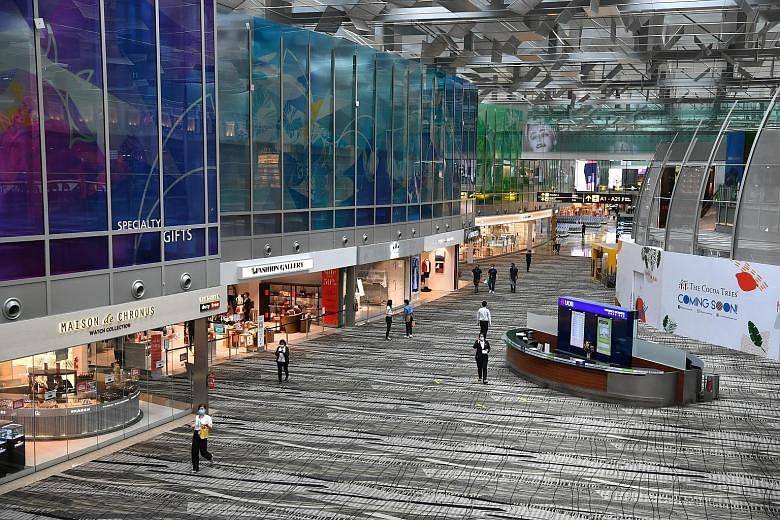The unilateral reopening of borders to Brunei and New Zealand is a "small, cautious" step that can resuscitate Changi Airport.
It is also an invitation to the world, saying that Singapore is open for business, said Transport Minister Ong Ye Kung yesterday.
"The aviation sector, Changi Airport and Singapore Airlines do not just concern the sector itself, but are linked to the whole economy," he said in an interview with reporters at the PSA Building.
"So we need to really start to take steps to open up in a safe manner that can revive Changi Airport and resuscitate the aviation sector."
The multi-ministry task force battling the Covid-19 outbreak is relaxing Singapore's border controls, so that visitors from Brunei or New Zealand who have remained in the country in the last consecutive 14 days prior to their visit to Singapore will not have to serve a stay-home notice when they arrive.
However, they will need to take a Covid-19 test upon their arrival at the airport, and will be allowed to go about their activities in Singapore only after receiving a negative test result.
Mr Ong said both countries have been able to control the Covid-19 outbreak, with infection rates well below 0.1 infection per 100,000 people in their population.
He also said the number of travellers coming from both countries would be manageable.
There are only two flights weekly that can fly a total of 500 passengers from Brunei to Singapore, said Mr Ong.
For New Zealand, there are four flights weekly that can fly a total of about 1,200 passengers.
Mr Ong said the countries' low infection rates, combined with the testing upon arrival, means "a very, very low risk that we can manage".
"I believe we can strike a good balance between keeping Singapore and travellers here safe, as well as reviving the air traffic sector."
The Ministry of Transport will announce operational details regarding the arrangement next week.
Visitors from Brunei and New Zealand who want to enter Singapore will have to apply for an Air Travel Pass between seven and 30 days before the intended date of arrival.
On this, Mr Ong said: "It gives us the flexibility that should there be an unfortunate turn of events, which I don't think there will be... we can quickly react. And so that is really the purpose of the Air Travel Pass."
The minister first floated the idea of unilaterally opening up Singapore's borders to countries where the virus has been brought under control in an address to Transport Ministry staff earlier this month.
He said then that Covid-19 has set Changi Airport back "by at least 40 years". Singapore's challenge, he said, is to restore passenger volume while keeping virus transmission under control.
In explaining why Singapore has taken the initiative to unilaterally ease restrictions on travellers coming in from Brunei and New Zealand, before reciprocal arrangements are made, Mr Ong said openness has been a hallmark of Singapore's history.
He cited how Singapore unilaterally became a free port 200 years ago, and also unilaterally opened up its skies in the 1980s when it built Terminal 1.
He added that the unilateral lifting of restrictions on travel does not preclude the Republic from negotiating reciprocal agreements with like-minded partners or going a step further in upgrading such agreements.
In response to a question about broader travel agreements with China, with which Singapore has a reciprocal green lane arrangement for essential and business travel, Mr Ong said in Mandarin that Singapore hopes to establish a safe travel bubble if both countries can reach a common understanding.
On a similar question about Japan, he said Singapore will consider the possibility of negotiating an air traffic corridor if there is an opportunity. He noted that Singapore and Japan already have plans to discuss a reciprocal green lane arrangement for essential business travel.
Asked which other countries Singapore could open its borders to, through either unilateral or bilateral agreements, Mr Ong said the Transport Ministry is working with the Ministry of Foreign Affairs and Ministry of Health to monitor the Covid-19 situation worldwide.
"I think a reasonable starting point is to look at those countries where the stay-home notice has been reduced to seven days, and to see whether there are possibilities to progress," he said.
These countries include China, Vietnam and Malaysia.
The key to encouraging travel again was to safely remove the quarantine requirements, Mr Ong added.
"I think the airline industry is quite clear - when you have a stay-home notice requirement, you do discourage travel quite a bit," he said. "So we have to try to have like-minded partners, similar risk profiles, similarly successful in controlling the virus, to open up a bubble, open up a channel, and use tests to replace stay-home notices."
The Changi air hub - which includes airlines, the airport and ground-handling firms - has been contributing more than 5 per cent of Singapore's gross domestic product and employing 192,000 people.
Experts have noted that the recovery for Singapore's aviation sector will be more difficult, given the lack of a domestic market here.
Last month, Changi Airport had just 86,000 passengers passing through. This was a 98.5 per cent drop compared with the same period last year.












